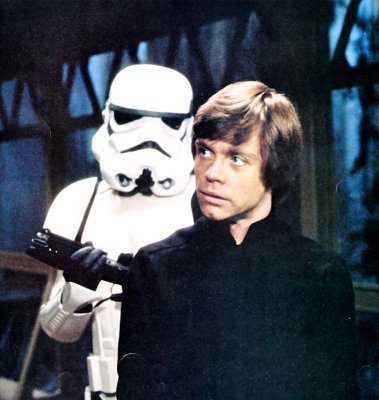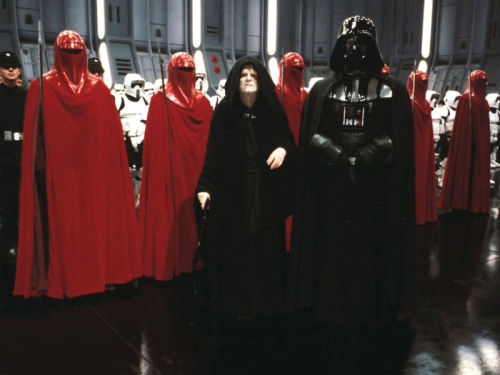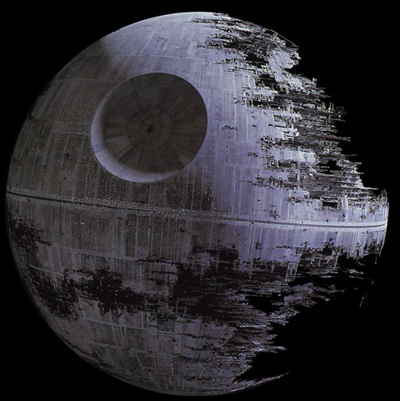Introduction
Like The Empire Strikes Back, Lucas funded it himself and was keen to look to a range of directors to helm the final film in the trilogy. He considered David Lynch and David Cronenberg and, had Lucas not left the American Guild of Directors, even considered Steven Spielberg. He settled on Richard Marquand, a young director from Wales. Time's had changed since The Empire Strikes Back. Harrison Ford was now a worldwide star - the role of Indiana Jones in Raiders of the Lost Ark secured him of that success, whilst the merchandising on the previous Star Wars films continued to be widely sold. Lawrence Kasdan was brought back on board to adapt Lucas' story - but certain decisions Kasdan and Marquand initially made were shut-down immediately by Lucas: Han Solo due to be killed off at the start of the film as a form of self-sacrifice; the Millenium Falcon assisting on Endor; the finale would see our heroes meet the Wookies civilisation. Whether due to a business-mind on Lucas's part - creating new teddy-bear-like characters called Ewoks - or having a passion for the story itself, these ideas were rejected.
 At any rate, much like Han Solo himself, the audience were frozen since The Empire Strikes Back but were well aware that a concluding chapter would arrive. Question is, would it fulfill all the expectations people had...
At any rate, much like Han Solo himself, the audience were frozen since The Empire Strikes Back but were well aware that a concluding chapter would arrive. Question is, would it fulfill all the expectations people had...Luke has become a Jedi...
One year following The Empire Strikes Back and it seems we are back to square-one. R2D2 and C3PO wander the desert of Tatooine, much like A New Hope, searching for Jabba The Hut's palace. In a long sequence, one by one, it seems that everyone gets captured: Han Solo is already trapped in carbonite; C3PO and R2D2 engage in comedy sequences as we see robots torn apart and C3PO act in horror. Even Princess Leia, in disguise, finds herself turn into a slave for Jabba the Hut. An iconic image that will remain in the minds of Star Wars fan-boys for the future - parodied countless times in Friends and How I Met Your Mother amongst many other programmes. As I noted in The Empire Strikes Back, it is as if the filmmakers wanted to see how low these characters could fall. The situation is bad enough at the end of The Empire Strikes Back without having to start off the next film with the characters all becoming captured or turned into slaves - even Luke, when he arrives, fails to stick-to-the-plan and finds himself fighting a rancor beast.
From the strength of The Empire Strikes Back, it is a real shame that the film dramatically drops in quality. A sequence that seems to drag on too long, reveals nothing new and devlops the story in no way at all, with appalling music to boot (apparently, the new music and creatures on the special edition is superior to the original music, but that can't be saying much...). Shockingly, we even finish the sequence by completely robbing Leia of her female independence and reducing her to a slave sex-object. The only redemption is in the devlopment of Luke himself.
His entire demeanour is a far cry from the teenager we first met during A New Hope. He appears stronger, calmer and almost like Vader himself in his cloak and confidence. You can see, merely by Hamill's acting, that he has completed his Jedi training. As the film rests firmly on Mark Hamill's shoulders, it is his role in Return of the Jedi that places this film ahead of the weaker films in the franchise - no other Star Wars film has Luke exude so much confidence. It also prepares us for the finale as we know that it is not a case of the underdog attempted to "win", the question is whether Luke will be able to resist tempatation.

Change of Perspective
"Luke, you're going to find that many of the truths we cling to depend greatly on our own point of view."Obi-Wan tells Luke as he returns to the franchise for his final "words-of-advice" sequence. The vast majority of the conflict between the prequels and sequels was discussed in the previous post on The Empire Strikes Back, except this time, Obi-Wan explains, in detail, what happened. On the one hand, his retracting of statements he made in the previous films seems a little forced: even Luke seems confused at the change in the 'galaxy'. But as Lucas has expertly shown us so far, rather than have this a merely tacked-upon measure to clarify the plot, the whole idea of persepctive is in fact ingrained within the story. Indeed, a change of perspective is what we are expected to clearly observe in the film - Darth Vader turning to the Dark Side shows us how a change in perspective is made, with huge consequence. The tension lies in Luke himself and whether he will even consider a change in perspective on The Empire. As he witnesses the trap the Empire has created to ensure the defeat of the Rebel Alliance, you can see the final option becoming that much clearer. Darth Sidious reminds us that his anger is what leads him to the Dark Side. He teases him and taunts him - the thin line between good and evil is becoming dangerously close to Luke. A thin line between the perspective of what is good and evil - and what defines the abuse of power and control.
Now we combine the two themes - an obsession with power and control the Sith seek, whilst both Vader and Sidious hold completely differing perspectives on the purpose of Luke ... if he was to join the force. Sidious tells Luke as he fights Vader -
"Good! Your hate has made you powerful. Now, fulfill your destiny and take your father's place at my side!"
But Vader tells Luke that he has a different purpose -
"Luke, you can destroy the Emperor. He has foreseen this. Join me and together we will rule the galaxy as father and son."It is clear to us, and Luke, that at its most powerful, the Empire is at a conflict with itself and to how it can continue. The lack of perspective and desire for power comes full circle.
 What is more interesting is the further parrallels to the prequels as Anakin ultimately turned to the Dark Side himself as he couldn't trust Obi-Wan. Luke has the same struggle as Obi-Wan has lied to him also (when will Obi-Wan learn?) and only through seeing the contradictions within the Dark Side, does Luke realise what is right. The theme of over-confidence is also brought up again. We know that Anakin's fatal flaw was his arrogance and pride - his expectation to become a Jedi Master and assumption that he could save Padme. His over-confidence is what destroyed him - so Luke's awareness of this vice becomes a major asset as he confronts the Emperor with the statement "Your over-confidence is your weakness". Ironically, the Emperors' response that his "faith in his friends" is his, recalls a lack of perspective on The Emperor's part. Cast your mind to Episode III: Revenge of the Sith. Anakin ignored advice and instructions off everyone who attempted to help him - ironically, Anakin's over-confidence and lack of faith in his friends and the Jedi, is what destroyed him.
What is more interesting is the further parrallels to the prequels as Anakin ultimately turned to the Dark Side himself as he couldn't trust Obi-Wan. Luke has the same struggle as Obi-Wan has lied to him also (when will Obi-Wan learn?) and only through seeing the contradictions within the Dark Side, does Luke realise what is right. The theme of over-confidence is also brought up again. We know that Anakin's fatal flaw was his arrogance and pride - his expectation to become a Jedi Master and assumption that he could save Padme. His over-confidence is what destroyed him - so Luke's awareness of this vice becomes a major asset as he confronts the Emperor with the statement "Your over-confidence is your weakness". Ironically, the Emperors' response that his "faith in his friends" is his, recalls a lack of perspective on The Emperor's part. Cast your mind to Episode III: Revenge of the Sith. Anakin ignored advice and instructions off everyone who attempted to help him - ironically, Anakin's over-confidence and lack of faith in his friends and the Jedi, is what destroyed him. |
| Calclus in the centre, confused as someone to be worshipped |
I am aware that a further connection to Tintin may appear false, but it strikes me as too similar to be completely ignored. C3PO, especially in Return of the Jedi seems to recall Professor Calculus from the Tintin comic strips. Calculus, like C3PO, is incredibly intelligent and additionally a little dotty and clumsy. Both characters have a similar figure - slim build, tall - and, in both Return of the Jedi and Herge's Prisoners of the Sun, both characters are mistaken for a God to be worshipped within a leafy, rainforest-like context: South America in Prisoners of the Sun, Endor in Return of the Jedi. It strikes me as more than possible that, as Spielberg - and Lucas - prepared Indiana Jones and the Temple of Doom, the reference to Tintin following Raiders of the Lost Ark, assured both filmmakers read the comic books. Inevitably, ideas from the books - Tintin in Tibet in The Empire Strikes Back (assuming the comics were read by Lucas prior to production on Raiders) and Prisoners of the Sun in Return of the Jedi - managed to creep into the script choices.
The very idea of influencing and recalling the past is touched upon as C3PO tells the story - or legend of Star Wars - to the Ewoks (who, in this instance, represent children). At this point in 1983, Lucas wants closure on the franchise, and he wants us to do the same by showing this sequence. As we have followed C3PO in the original trilogy, we also are expected to continue to tell the story to our own children and continue the fascination in the saga. Lucas is proud of the films created - but the stories are expected to be told and retold rather than built upon further, time and time again. But, ironically, the speed racers that appear in the same section of the film closely resemble the podraces in The Phantom Menace. On a thematic level, it is as if Luke has his fathers knowledge of podracing in the closing chapter of the franchise. Strange to think that Lucas was oblivious to the connection this sequence would have to his filmmaking decades later.
Filling that Hole...
To close these essays, it is worth highlighting how the final film reveals a recurring theme of incompletion. The Death Star itself is incomplete, both Vader and Luke are physically incomplete as they both have missing hands whilst Luke is expected to only "complete" his training as a Jedi by defeating Darth Vader.This could relate to a number of interpretations - the idea that everyone has a spiritual and emotional need that requires 'filling'. It could be filled with the force - with God and faith - as Luke attempts, but it could equally be filled with love or evil. Han Solo, at no point, learns the power of 'the force', but his need is filled by his love for Leia. Vader and the Emperor both crave power and control - and manage to fill this need by turning to the Dark Side. The closing statement I believe Lucas is saying - and all six-films connect to this - is regarding our own morals and outlook on life. Everyone wants to lead a fulfilling life - but how they do this, is dependent on the influences, experiences and support by people around them. Whether they will turn to the 'Dark Side' and lead an immoral life or whether they lead a moral and 'Jedi-like' life, it is worth noting the fine line between what constitues good and evil - and how easy one can turn when tempted by power. Luke is challenged and nearly turns, whilst Anakin is seen to become one of the most dangerous villains the galaxy has ever seen - despite his good intentions.
I do believe that the finale of Return of the Jedi is brilliant. Connecting all six films by seeing the entire galaxy celebrate - Corsucant, Cloud City, etc - is recalling the entire six-film journey you have been on. Even Hayden replacing Sebastian Shaw as the ghost of Anakin I believe is well-suited. No offence to Shaw - he was fine - but as an actor, cleaned-up, he has no connection to the scarred-Anakin Luke speaks to - he is so damaged that you can barely make out the actor himself - or the many versions of Vader we have seen up until this point. At least Jake Lloyd didn't show up.
The last line shared between Luke and Anakin are Lukes ever-optimistic "I will save you" as Anakin responds "you already have...". It is unfortunate that this feeds so nicely with a Christian interpretation of the films. As if to highlight that his final moments will ensure his 'saving' in the afterlife perhaps? At any rate, ignoring this interpretation, the hole everyone has needs to be filled with love - love for each other, love for you enemies and the love for your friends. Throughout Return of the Jedi and, one of the twists [that still works in the context of the Saga] at the end of The Empire Strikes Back is the connection telepathitically between Vader and Luke. It is not an external consciense Vader has - it is his responsibilities, his child, who taunts him and slowly chips away at his armour. Rather than arguing with a heavenly - or messianic figure - who directs Vader and/or Luke. It is their awareness of each other than forces them to face each other again. Luke has a responsibility to support his Father, whilst very slowly, Vader realises his duty is to protect his Son.
This is what concludes the Saga. Not an automatic-saving through grace or faith, but rather an awareness of love and responsibility for each other. Luke forgives his Father and stands by him - it is only the Emperor who feeds both characters hatred by taunting them both in the final duel. This is the never-ending battle - the choice to listen to your heart and 'save' those you love from harm and danger. A theme that we know from the very start - Qui Gon Jin saving Anakin from a life of slavery in The Phantom Menace, Anakin and Obi-Wan protecting Padme in Attack of the Clones, Obi-Wan's protection and saving of the baby's Luke and Leia in Revenge of the Sith - and Luke's protection and love for his friends since A New Hope. This is what continues our own existence and our future.



No comments:
Post a Comment
Copyright 2008-2015. All posts & reviews are property of www.simoncolumb.wordpress.com/Simon Columb and should not be reproduced in whole, or in part, without express permission from the author.